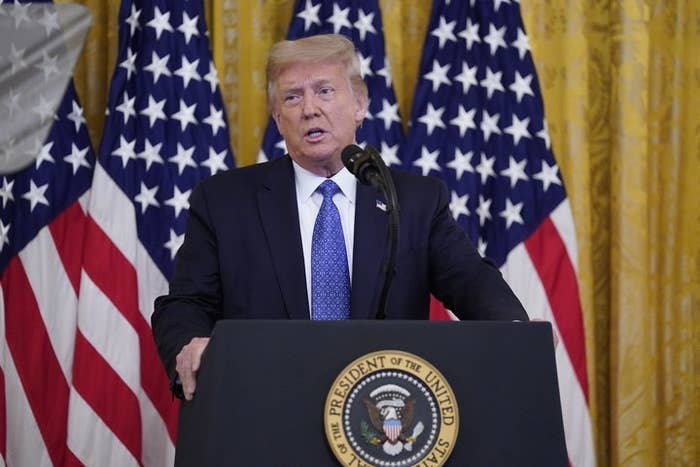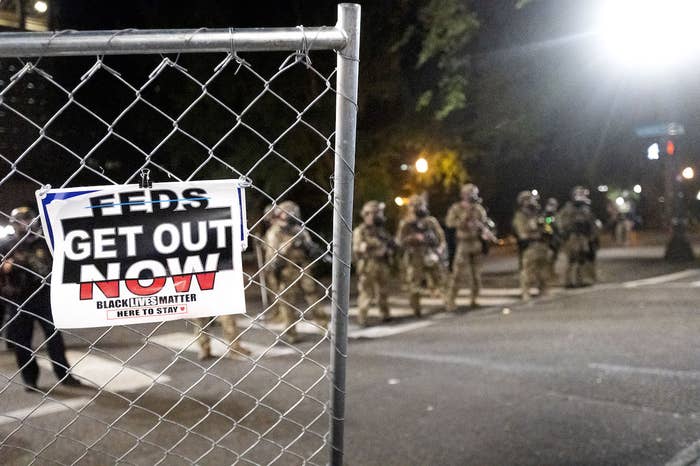
President Donald Trump said he will send more federal officers to Chicago and Albuquerque, New Mexico, because local officials aren't doing enough to combat violent crime.
The decision to keep deploying federal agents to cities comes despite criticism from state and local officials that they're only making things worse, particularly in Portland, Oregon, where protesters were picked off the streets by camouflage-wearing officers and scurried away in unmarked vehicles.
Attorney General Bill Barr and acting Homeland Security Secretary Chad Wolf said the federal response in Chicago and Albuquerque would be different from the actions of agents in Portland — which centered on demonstrators outside a federal courthouse — and instead focus on crime fighting alongside local police.
"We just started this process, and frankly we have no choice but to get involved," Trump said. "This bloodshed must end. It will end."
But the presence of federal police in Portland and Trump's public threats to deploy them to other cities have drawn concern from local officials, who have already said publicly that a federal presence would not be welcomed.
"Hundreds of skilled law enforcement officers" from the FBI, US Marshals Service, the Department of Homeland Security, and other agencies will be sent to Chicago to help quell a rise in gun violence, Trump said. Dozens of others will be sent to Albuquerque.
Shortly after the announcement, Chicago Mayor Lori Lightfoot blasted the president's decision.
"The president has been on a campaign now for some time against Democratic mayors across the country," Lightfoot said at a news conference. "The president is trying to divert attention from his failed leadership on COVID-19."

In announcing "Operation Legend" at the White House on Wednesday, Trump also attacked local politicians for pushing back against the idea of federal officers getting involved.
"They should call. They should want it," he said. "They're too proud, or they're too political to do that."
Trump admitted officials were sending federal agents despite the objections of local officials, but said the administration would, and could, override them.
"The mayor [of Chicago] is telling us not to come in," Trump said. "At some point we can void that if we have to and we may have to because it's out of control. I'm assuming she's saying that for political reasons."
Although federal authorities often work with local law enforcement agencies in task force groups across the country, the objections from local officials were sparked after federal agents were deployed to Portland.
The city has seen weeks of demonstrations against police brutality since the killings of George Floyd in Minneapolis and Breonna Taylor in Louisville. The demonstrations have drawn extensive criticism from Trump, who has urged local leaders to take a heavier handed approach against protesters he has called "anarchists."
The Trump administration's deployment of multiple federal agencies to Portland to support the Federal Protective Service's guard around the courthouse, which has incurred damage and vandalism during the endless protests and drawn rage and condemnation from across the country. Countless videos posted on social media show federal officers grabbing protesters from their cars, violently attacking others, and taking demonstrators away in unmarked vehicles.
Multiple lawsuits have since been filed against the police and federal agencies for violating protesters' civil rights with their use of force tactics.
On Tuesday, Wolf defended his the Department of Homeland Security's actions and blamed state and local officials for failing to quell "violent criminal activity." He added that the coordinated federal response was warranted and needed because "violent anarchists" are different in Portland than in other US cities.
"Portland is different than what we see from any other city. ... If we left tomorrow, they would burn [the courthouse] down," he said.
But the presence of federal agents in Portland have already sparked two lawsuits and increased tensions in the streets, where demonstrators against police brutality have now also been calling for the removal of federal officers.
It has also increased tensions between local politicians over suspicions over whether some city officials have been working quietly in tandem with federal agents.
Some officials in Portland have lambasted other leaders, including Mayor Ted Wheeler, for allegedly hiding the fact that the Portland Police Bureau has been working with federal officers during their highly criticized response to protesters around the courthouse. Both the mayor and police officials have denied having an integral part in the federal agencies' deployment in Portland in recent weeks, according to the Oregonian.
However, City Commissioner Jo Ann Hardesty, a long-outspoken critic of her city's police department, said Tuesday that she had just learned an employee with the Department of Homeland Security had been "embedded" with the Portland Police Bureau "since day one."
Speaking on a panel hosted by the Western States Center about the Trump administration’s "misuse of armed federal agents," Hardesty said Portland police have "consistently lied to the public, to our congressional delegation" about their relationship with "this federal secret police force."
"We just found this week after six weeks of being told that there was no coordination that in fact there was a Homeland Security person embedded in Portland police emergency command center from day one," she said.
On Wednesday, Barr said this new federal deployment would serve a different purpose than protecting facilities.
"This is a different operation obviously from the tactical teams that we use to defend against riots and mob violence, and we're going to continue to confront mob violence," he said. "But the operations we’re discussing today are very different. They are classic crime fighting."
Wolf said operations in Portland were deployed because of "coordinated violent attacks by anarchists against a federal courthouse," while the agents being deployed to Chicago and Albuquerque were because of "an unprecedented rise in crime against fellow citizens."
"I'm ready to pull my officers out of there if the violence stops," Wolf said. "Portland is unique. There's no other city like it right now where we see this violence at federal courthouses."
Federal officers have arrested 43 people in Portland since July 4.
Still, even before Trump's announcement, local officials have been highly critical, calling the federal force "Trump's secret police" and "an unconstitutional affront to representative democracy."
"We always welcome partnerships in constitutional crime fighting that are in step with our community, but we won't sell out our city for a bait and switch excuse to send secret police to Albuquerque," Mayor Tim Keller said in a statement. "Operation Legend is not real crime fighting; it's politics standing in the way of police work and makes us less safe."
Albuquerque's police chief has also pushed back against the deployment and Trump's claim that violent crime had increased in the city.
"Contrary to claims by politicians in Washington D.C., Albuquerque has been keeping overall violent crime flat and has reduced homicides so far this year," Chief Michael Geier said. "While we welcome any assistance and additional resources to address violent crime, the President promised help in the past and has not yet followed through."
Lightfoot had threatened to sue the Trump administration if it unilaterally sent federal agents into the city, but the Chicago Tribune reported the mayor changed her tone after speaking with John Lausch, the US attorney of the Northern District of Illinois, who told her agents would be working "collaboratively" with local authorities.
As he faces reelection in November, Trump has been threatening to send federal officers and the US military into city streets to face off against protesters. "If a city or state refuses" to call in the National Guard, Trump said in June, "then I will deploy the United States military and quickly solve the problem for them."
On Wednesday, Trump criticized demonstrators, efforts to "defund the police," and politicians who have called for diverting law enforcement money to social programs.
"These same politicians have now embraced the far-left movement to break up our police department, causing violent crime in their cities to spiral, and I mean spiral seriously out of control," he said.
On Friday, the American Civil Liberties Union Foundation of Oregon filed what it said would be just one of many lawsuits against federal authorities. The US attorney for Oregon has also called on the inspector general to investigate the federal response and filed a lawsuit against several federal agencies for "overstepping their powers and injuring or threatening peaceful protesters."
Trump's decision to send federal officers to Chicago came three days after the officers' police union there reached out directly to the White House, claiming the mayor had "lost any control of the city."
"Mayor Lightfoot has proved to be a complete failure who is either unwilling or unable to maintain order here," John J. Catanzara Jr., the president of the Fraternal Order of Police Chicago Lodge 7, wrote in a letter to Trump. "I hope this letter is the beginning of a unique and dynamic alliance that will help save Chicago."
The decision to send 35 federal agents to Albuquerque also came a day after Trump met with Bernalillo County Sheriff Manuel Gonzalez in the White House.
But mayors from other cities where Trump has threatened to deploy federal forces, including Chicago, have also reached out to Barr and Wolf, arguing that the deployment of federal officers in US cities is "unacceptable and chilling."
"Deployment of federal forces in the streets of our communities has not been requested nor is it acceptable," a letter from the mayors stated. "These are tactics we expect from authoritarian regimes — not our democracy."

